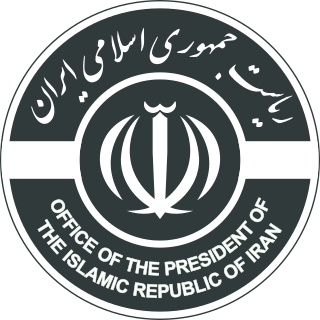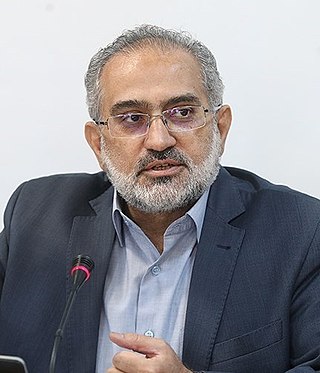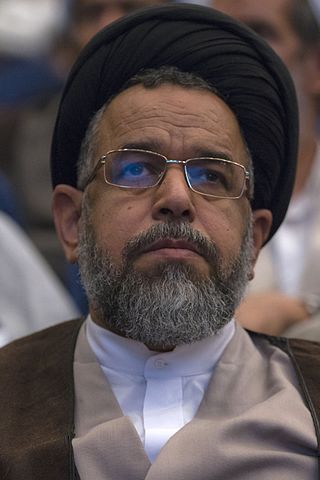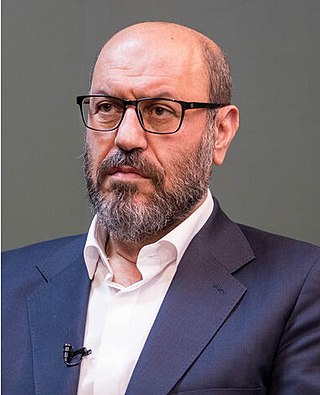
The president of Iran is the head of government of the Islamic Republic of Iran. He is the second highest-ranking official, after the Supreme Leader. The first election was held in 1980 and Abulhassan Banisadr won. Mohammad Mokhber, the first vice president, is acting as president following the death of Ebrahim Raisi on 19 May 2024.

The Islamic Revolutionary Guard Corps, also called Sepah or Pasdaran, is a multi-service primary branch of the Iranian Armed Forces. It was officially established by Ruhollah Khomeini as a military branch in May 1979, in the aftermath of the Iranian Revolution. Whereas the Iranian Army protects the country's sovereignty in a traditional capacity, the IRGC's constitutional mandate is to ensure the integrity of the Islamic Republic. Most interpretations of this mandate assert that it entrusts the IRGC with preventing foreign interference in Iran, thwarting coups by the traditional military, and crushing "deviant movements" that harm the ideological legacy of the Islamic Revolution. Currently, the IRGC is designated as a terrorist organization by Bahrain, Saudi Arabia, Sweden and the United States.

Mohammad Reyshahri, also known as Mohammad Mohammadi-Nik, was an Iranian politician and cleric who was the first Minister of Intelligence, serving from 1984 to 1989 in the cabinet of Prime Minister Mir-Hossein Mousavi.

Mohammad-Hossein Saffar-Harandi is an Iranian politician who was minister of culture and Islamic guidance of Iran from 21 August 2005 until 23 July 2009 when he resigned after opposing the appointment of Esfandiar Rahim Mashaei as vice president. He is currently member of the Expediency Discernment Council.

Mohammad Hossein-Zadeh Hejazi was an Iranian military commander in the Islamic Revolutionary Guard Corps.

Mostafa Pour-Mohammadi is an Iranian politician and prosecutor, who has served at different positions and cabinet posts. He was minister of interior from 2005 to 2008 and minister of justice from 2013 until 2017. Pourmohammadi is reportedly implicated in the 1988 Massacre of Iranian Prisoners.

The following outline is provided as an overview of and topical guide to Iran:

Sayyid Mojtaba Hosseini Khamenei is an Iranian Shia cleric and son of Ali Khamenei, the Supreme Leader of Iran. He served in the Iran–Iraq War from 1987 to 1988. He also reportedly took control of the Basij militia that was used to suppress the protests over the 2009 election.

The Cabinet of Iran is a formal body composed of government officials, ministers, chosen and led by the President of Iran. Its composition must be approved by a vote in parliament. According to the Constitution of the Islamic Republic of Iran, a president may dismiss members of the cabinet, but must do so in writing, and new appointees must again be approved by parliament. The cabinet meets weekly on Saturdays in Tehran. There may be additional meetings as circumstances require. The president chairs them. The Supreme Leader of Iran Ali Khamenei has the power to dismiss cabinet members like ministers, vice presidents and presidents at any time, regardless of parliamentary decisions.

The Qom Seminary is the largest Islamic seminary (hawza) in Iran, established in 1922 by Grand Ayatollah Abdul-Karim Haeri Yazdi in Qom. It trains Usuli scholars.

The supreme leader of Iran ), also referred to as supreme leader of the Islamic Revolution, but officially called the Supreme Leadership Authority, is the head of state and the highest political and religious authority of the Islamic Republic of Iran. The armed forces, judiciary, state television, and other key government organizations such as the Guardian Council and Expediency Discernment Council are subject to the Supreme Leader. According to the constitution, the Supreme Leader delineates the general policies of the Islamic Republic, supervising the legislature, the judiciary, and the executive branches. The current lifetime officeholder, Seyyed Ali Hosseini Khameneh known as Ali Khamenei, has issued decrees and made the final decisions on the economy, the environment, foreign policy, education, national planning, and other aspects of governance in Iran. Khamenei also makes the final decisions on the amount of transparency in elections, and has dismissed and reinstated presidential cabinet appointees. The Supreme Leader is legally considered "inviolable", with Iranians being routinely punished severely for questioning or insulting him.

Mohammad Hosseini is an Iranian politician, who served as the vice president for parliamentary affairs in the cabinet of Ebrahim Raisi from 2021 to 2024.

Seyyed Mahmoud Alavi is an Iranian conservative politician, and formerly minister of intelligence in Hassan Rouhani's government.

Hossein Dehghani Poudeh, commonly known as Hossein Dehghan, is an Iranian military officer and former IRGC Air Force officer with the rank of brigadier general. He is currently head of the Mostazafan Foundation since 2023.

Ebrahim Raisolsadati, commonly known as Ebrahim Raisi, was an Iranian politician who served as the eighth president of Iran from 2021 until his death in 2024. Raisi began his clerical studies at age 15. He was a Muslim jurist and part of the Principlist group.

Esmail Qaani is an Iranian brigadier general in the Islamic Revolutionary Guard Corps (IRGC) and commander of its Quds Force — a division primarily responsible for extraterritorial terror and clandestine operations. The Supreme Leader of Iran, Ali Khamenei, appointed Qaani to succeed Qasem Soleimani as Commander of the Quds Force.
Supreme Council of Cyberspace (Iran) (Persian: شورای عالی فضای مجازی) is a cyberspace-council which was formed on 26 February 2012 by the decree of Iran's supreme leader, Seyyed Ali Khamenei; and is obliged to establish "National Cyberspace Center of the country" to have an entire and up-to-date knowledge of internal/external cyberspace and in order to decide regarding "how to deal with the harms of the Internet".
The 2024 Iranian Assembly of Experts election were held on 1 March 2024, concurrently with the elections of the Islamic Consultative Majlis. Directly elected by the public from a list of candidates vetted by the Guardian Council, the Assembly of Experts is made up of 88 clerics with the responsibility of supervising the Supreme Leader and selecting a new one.

Mohammad Mokhber is the acting President of Iran. He is currently serving his term as acting president and, second to the Supreme Leader, is leading an interim government of the Islamic Republic of Iran. On 19 May 2024, after the death of President Ebrahim Raisi, Mokhber assumed the role of Acting President of Iran and was confirmed in his position by Supreme Leader Ali Khamenei on 20 May. The cabinet of Mohammad Mokhber was inherited from the cabinet of Ebrahim Raisi. The main responsibility of this government will be holding a new presidential election which is set to be held on 28 June 2024.



















